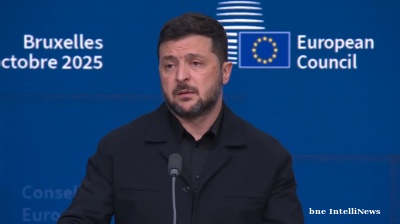Hungary's Foreign Minister Peter Szijjarto has warned that a durable solution is urgently needed following Ukraine's decision to cut off oil deliveries from Russia’s Lukoil, causing a significant disruption to Hungary's oil supply.
Szijjarto, speaking to reporters in Budapest, stated that while temporary measures have stabilised the situation, these stopgaps are insufficient even for the medium term. "Hungary and Slovakia’s oil security is at risk," he said, highlighting the critical nature of the supply chain disruption caused by Ukraine’s decision.
Ukraine’s recent sanctions have barred Lukoil from using the country for transit, affecting both Hungary and Slovakia, which together receive 2mn tonnes per year (tpy) of crude oil from Lukoil. The Russian oil giant accounts for half of the supply on the Druzhba pipeline, a crucial artery for eastern Europe’s oil supply.
While other countries have successfully weaned themselves off Russian oil and gas, Hungary remains 70% dependent on Russia for its energy supplies, most of which are delivered using the old Soviet-era pipeline infrastructure.
According to the Center for Research on Energy and Clean Air think tank, Hungary spent almost a quarter of a billion euros on Russian crude and gas in April this year alone, Politico reports. Russia earned an estimated $180bn from oil exports in 2023, according to the Kyiv School of Economics (KSE).
The supply halt has placed Hungary and Slovakia in a precarious position, prompting both nations to plan to raise the issue at the upcoming EU foreign ministers’ meeting on July 22. Hungary is already warning of an energy crisis if it cannot find alternative supplies of energy – a logistical headache, given Hungary’s distance from the seas that would allow it to import oil or LNG from other suppliers.
The move by Ukraine is seen as a retaliatory action against Hungary, following a series of political and diplomatic disputes. Hungarian Prime Minister Viktor Orban has incensed both Kyiv and Brussels with his recent “peace mission” and controversially met with Russian President Vladimir Putin in Moscow on July 5. The EU elite have been clear that Orban has no mandate to speak on behalf of either the EU or Ukraine, despite Hungary taking over the rotating EU presidency on July 1.
Szijjarto did not provide specifics on the temporary measures currently in place, nor did he outline potential long-term solutions.
Prices for power are expected to sky-rocket in the coming weeks as Hungary’s strategic reserves of oil and gas are used but, enough to last three months, according to local reports, that could lead to blackouts and fuel shortages.
Ukraine’s sanctions on oil transiting its territory only apply to the privately owned Lukoil. Kyiv's pipeline operator UkrTransNafta to reject applications for Lukoil-contracted oil to pass through Druzhba. The transit of oil from the other Russian companies of state-owned Rosneft and privately owned Tatneft have not been affected. One option open to Budapest is to increase supplies from these two companies.
The situation is complicated by the fact that the pipeline also ships Kazakh oil to Germany’s Schwedt refinery that is a key supplier of oil products to northern Germany and the capital of Berlin.
So far, the sanctions have only affected Hungary, but Slovakia and Czechia also receive oil from Russia via the Druzhba pipeline that still carries 200,000 barrels per day (bpd) of crude.
Slovakia’s populist Prime Minister Robert Fico has also slammed Ukrainian sanctions against Russian oil giant Lukoil. Imports of Russian oil to Slovnaft, Slovakia’s key refinery controlled by Hungarian MOL, are largely halted after Ukraine tightened sanctions against Russian oil giant Lukoil.
Budapest is also looking at increasing oil supplies via alternative routes such as from Croatia via the Adria Pipeline. But these scenarios face pipeline capacity limitations.
News
Category 5 hurricane Melissa bears down on Jamaica with Haiti and Cuba in storm's path
A catastrophic Category 5 hurricane was bearing down on Jamaica on Monday, October 27 afternoon with sustained winds of up to 282kph (175mph), threatening to become the strongest storm the Caribbean island has ever experienced.
.jpg)
US senator tells Maduro "head to Russia or China" as warships close in on Venezuela
A senior US Republican senator has warned that Venezuelan President Nicolás Maduro's time in power is running out and suggested he leave the country, as military tensions in the Caribbean continue to escalate.

Milei celebrates resounding victory in Argentina's midterm elections
Argentine President Javier Milei scored a major win for his La Libertad Avanza (LLA) party in Argentina's October 26 midterm legislative elections, as the party obtained approximately 40.84% of the nationwide vote with 99.14% of the votes counted.

Zelenskiy accuses China of aiding Russia’s war effort through industrial and military support
Ukrainian President Volodymyr Zelenskiy accused China of materially supporting Russia’s military-industrial complex, providing key technologies and resources that have enabled Moscow to sustain and scale its war effort against Ukraine.

